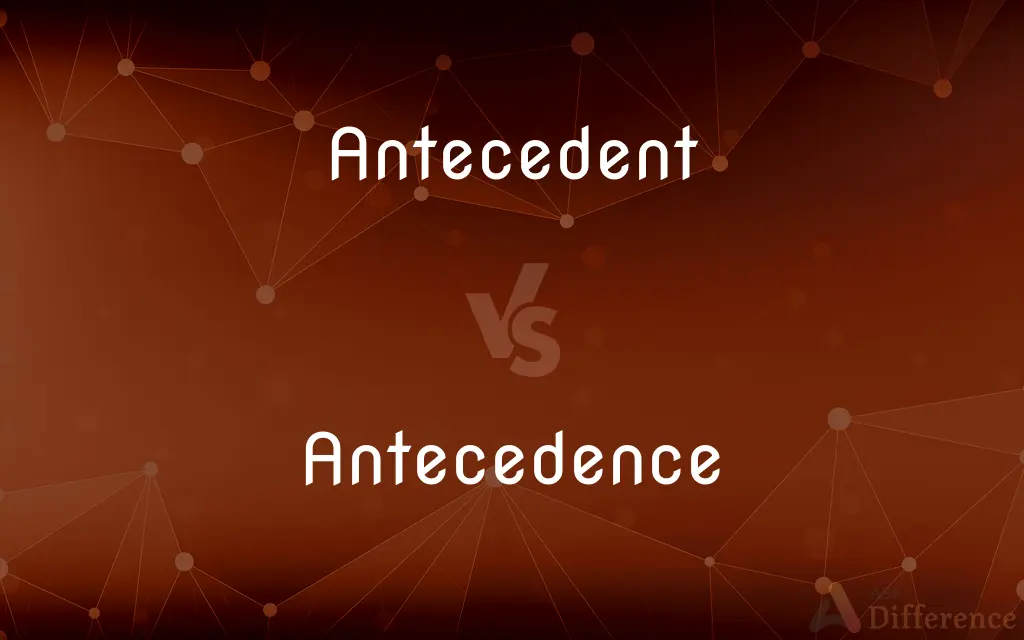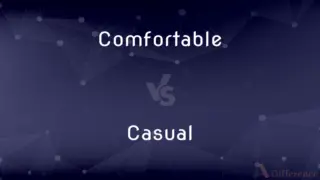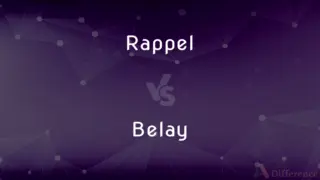Antecedent vs. Antecedence — What's the Difference?
By Fiza Rafique & Maham Liaqat — Updated on April 9, 2024
Antecedent refers to something that precedes another thing, often used in grammar to denote a preceding word or phrase, while antecedence is the state or condition of being prior in time or order.

Difference Between Antecedent and Antecedence
Table of Contents
ADVERTISEMENT
Key Differences
An antecedent is a term primarily used in the context of grammar to describe a word, phrase, or clause that is replaced by a pronoun or other substitute later in the sentence. For example, in the sentence "The car broke down because it was old," "the car" is the antecedent of "it." On the other hand, antecedence refers more broadly to the concept of preceding in time or order, without being limited to linguistic use. It can apply to any scenario where one event or item precedes another in sequence.
Antecedent is crucial for understanding the coherence and meaning of sentences, ensuring that pronouns and their references are clear. Antecedence, whereas, plays a significant role in discussions about history, causality, and temporal sequences, indicating the priority of one event or entity over another.
In practical usage, antecedent helps maintain clarity in communication, avoiding ambiguity about what or whom is being referred to. In contrast, antecedence is often discussed in philosophical, historical, and causal analyses, providing a framework for understanding the sequence and relationship between events or concepts.
The application of antecedent is mostly seen within the confines of sentence structure and grammatical correctness. Antecedence, on the other hand, finds its relevance in broader contexts, such as in the analysis of cause and effect, historical timelines, and the precedence of ideas or innovations.
While both concepts deal with the idea of something preceding another, antecedent is specific to linguistic elements, ensuring the coherence of language. Antecedence, conversely, is a more abstract concept that transcends linguistic boundaries, offering insight into the temporal relationships between wider phenomena.
ADVERTISEMENT
Comparison Chart
Definition
A word, phrase, or clause that a pronoun or other substitute refers to later.
The state or condition of being prior in time or order.
Context of Use
Primarily in grammar and linguistics.
Broadly in philosophy, history, and general analysis.
Importance
Ensures clarity and coherence in sentences.
Helps understand temporal sequences and relationships.
Examples
"John" in "John went home because he was tired."
The invention of the wheel has antecedence over modern transportation.
Application
Sentence structure and grammatical correctness.
Analysis of historical events, causality, and the precedence of concepts.
Compare with Definitions
Antecedent
It refers to what a pronoun replaces.
The students wanted their results, where students is the antecedent of their.
Antecedence
Antecedence signifies precedence in time or order.
In law, precedent cases have antecedence over current cases.
Antecedent
An antecedent is a preceding word or phrase in a sentence.
In Sally dropped her book, Sally is the antecedent of her.
Antecedence
Antecedence indicates a prior occurrence or existence.
The theory of evolution has antecedence over genetic engineering.
Antecedent
They are essential for grammatical coherence.
Alice lost her keys, Alice being the antecedent of her.
Antecedence
Antecedence is critical in understanding historical timelines.
The Renaissance has antecedence over the Enlightenment.
Antecedent
Antecedents can be nouns or phrases.
The broken window, which was old, ... where The broken window is the antecedent.
Antecedence
It applies to concepts, events, or objects.
The discovery of fire has antecedence in human history.
Antecedent
Antecedents provide clarity to whom or what pronouns refer.
If the shoe fits, wear it, with the shoe as the antecedent of it.
Antecedence
It helps in analyzing cause and effect.
Agricultural development has antecedence over urban settlement patterns.
Antecedent
Preceding in time or order
Antecedence
Precedence.
Antecedent
A thing that existed before or logically precedes another
Some antecedents to the African novel might exist in Africa's oral traditions
Antecedence
The relationship of preceding something in time or order.
Antecedent
A person's ancestors or family and social background
Her early life and antecedents have been traced
Antecedence
That which precedes something or someone (e.g. prior events, origin, ancestry).
Antecedent
An earlier word, phrase, or clause to which another word (especially a following relative pronoun) refers back.
Antecedence
The length of time by which one event or time period precedes another.
Antecedent
The statement contained in the ‘if’ clause of a conditional proposition.
Antecedence
(grammar) The relationship between a pronoun and its antecedent.
Antecedent
Preceding in time or order; previous or pre-existing
Antecedent events
Antecedence
(geology) A geologic process that explains how and why antecedent rivers can cut through mountain systems instead of going around them.
Antecedent
Denoting or counting as an antecedent.
Antecedence
An apparent motion of a planet toward the west.
Antecedent
Going before; preceding.
Antecedence
The act or state of going before in time; precedence.
Antecedent
One that precedes another.
Antecedence
An apparent motion of a planet toward the west; retrogradation.
Antecedent
A preceding occurrence, cause, or event.
Antecedence
Preceding in time
Antecedent
Antecedents The important events and occurrences in one's early life.
Antecedent
Antecedents One's ancestors.
Antecedent
(Grammar) The word, phrase, or clause that determines what a pronoun refers to, as the children in The teacher asked the children where they were going.
Antecedent
(Mathematics) The first term of a ratio.
Antecedent
(Logic) The conditional member of a hypothetical proposition.
Antecedent
Earlier, either in time or in order.
An event antecedent to the Biblical Flood
An antecedent cause
Antecedent
Presumptive.
An antecedent improbability
Antecedent
Any thing that precedes another thing, especially the cause of the second thing.
Antecedent
An ancestor.
Antecedent
(grammar) A word, phrase or clause referred to by a pronoun.
Antecedent
(logic) The conditional part of a hypothetical proposition, i.e. , where is the antecedent, and is the consequent.
Antecedent
(logic) The first of two subsets of a sequent, consisting of all the sequent's formulae which are valuated as true.
Antecedent
(math) The first term of a ratio, i.e. the term a in the ratio a:b, the other being the consequent.
Antecedent
Previous principles, conduct, history, etc.
Antecedent
Going before in time; prior; anterior; preceding; as, an event antecedent to the Deluge; an antecedent cause.
Antecedent
Presumptive; as, an antecedent improbability.
Antecedent
That which goes before in time; that which precedes.
The Homeric mythology, as well as the Homeric language, has surely its antecedents.
Antecedent
One who precedes or goes in front.
My antecedent, or my gentleman usher.
Antecedent
The earlier events of one's life; previous principles, conduct, course, history.
If the troops . . . prove worthy of their antecedents, the victory is surely ours.
Antecedent
The noun to which a relative refers; as, in the sentence "Solomon was the prince who built the temple," prince is the antecedent of who.
Antecedent
The first or conditional part of a hypothetical proposition; as, If the earth is fixed, the sun must move.
Antecedent
The first of the two terms of a ratio; the first or third of the four terms of a proportion. In the ratio a:b, a is the antecedent, and b the consequent.
Antecedent
Someone from whom you are descended (but usually more remote than a grandparent)
Antecedent
A preceding occurrence or cause or event
Antecedent
Anything that precedes something similar in time;
Phrenology was an antecedent of modern neuroscience
Antecedent
The referent of an anaphor; a phrase or clause that is referred to by an anaphoric pronoun
Common Curiosities
What is the difference between antecedent and antecedence?
Antecedent refers to a preceding word or phrase in a sentence, while antecedence is the condition of being prior in time or order.
Can antecedent apply outside of grammar?
While antecedent is primarily used in grammatical contexts, its concept of something preceding another can be metaphorically applied in other areas.
Is antecedence relevant in everyday language?
While not commonly used in everyday conversation, antecedence is relevant in discussions involving time sequences, precedence, and historical context.
How does antecedence affect historical analysis?
Antecedence helps in understanding the sequence and impact of historical events, determining which occurred first and influenced subsequent developments.
How do you identify an antecedent in a sentence?
Identify the pronoun and then determine which word or phrase it refers back to; that word or phrase is the antecedent.
Why is understanding antecedence important?
Understanding antecedence is crucial for grasping the relationships and influences among events, ideas, or historical periods.
How does antecedence relate to causality?
Antecedence is a component of causality, as it establishes a temporal framework within which cause and effect relationships can be analyzed.
Can antecedence be used to predict future events?
While it can provide context for understanding potential future trends, antecedence alone is insufficient for accurate predictions.
Does antecedence imply causation?
Antecedence indicates a temporal sequence but does not necessarily imply causation without additional evidence.
Can a single sentence have multiple antecedents?
Yes, a sentence can have multiple antecedents if it contains several pronouns referring back to different words or phrases.
How is antecedence determined in complex systems?
In complex systems, determining antecedence may require detailed historical, chronological, or causal analysis.
Can antecedence apply to technological developments?
Yes, it can indicate which technologies or innovations came before others and set the stage for subsequent advancements.
How do linguists use the concept of antecedent?
Linguists study antecedents to understand pronoun reference and cohesion in discourse, which are key to sentence structure and meaning.
Why is clarity of antecedent important in legal documents?
Clarity of antecedents in legal documents is crucial to avoid ambiguity, ensuring that references and terms are understood unequivocally.
Is there a relationship between antecedent and precedent?
Both terms involve something coming before another; however, "precedent" often refers to a decision or event that serves as a model or justification for future occurrences, especially in legal contexts.
Share Your Discovery

Previous Comparison
Comfortable vs. Casual
Next Comparison
Rappel vs. BelayAuthor Spotlight
Written by
Fiza RafiqueFiza Rafique is a skilled content writer at AskDifference.com, where she meticulously refines and enhances written pieces. Drawing from her vast editorial expertise, Fiza ensures clarity, accuracy, and precision in every article. Passionate about language, she continually seeks to elevate the quality of content for readers worldwide.
Co-written by
Maham Liaqat













































